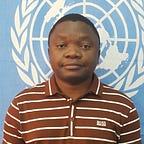Two refugees, two destinies
Have you ever talked to a refugee?
Felicien Kezyera, 21, from Burundi, was born in a refugee camp in Tanzania and has lived all his life criss-crossing borders and moving from one refugee camp to the next. In search of his father, he walked thousands of miles across different countries — from Tanzania back to Burundi until he found him at Dzaleka refugee camp in Malawi in 2014. Because of multiple displacements, it has never been easy for Felicien to focus on his education. Now that he has found some stability in Malawi, he wants to pursue his dreams.
“I can now think of taking care of my future, and continue with my education.”
“My family is fragmented. My mother is in Uganda, while my brothers are in Tanzania and Burundi. But I am thankful that I am here. It’s peaceful, and with the food assistance I receive, I can now think of taking care of my future, and continue with my education,” says Felicien.
Malawi — a country where half of the fast-growing population lives in extreme poverty — hosts over 38,000 refugees. Last year alone, it received about 6,000 new asylum seekers, mainly from the Democratic Republic of Congo.
Francoise Wizeyimana, 22, and her mother fled Rwanda after the death of her father in the genocide and crossed several borders in search of peace. In 1998, Francoise, her six siblings and her mother arrived at Dzaleka camp in Malawi, the place they call home today.
“My mother and I depend completely on the food we receive from WFP to survive.”
“Life in the camp has not been easy. I have six siblings and with no source of income, no land to cultivate, my mother and I depend completely on the food we receive from WFP to survive,” says Francoise. “Being the oldest child, I support my mother by doing piecework like washing people’s clothes, and we use the little money I make to meet other family needs.”
Designed to accommodate 10,000 people, Dzaleka camp now hosts about 38,000.
Malawi’s policies restrict movement of refugees and access to formal employment. This means refugees cannot access arable land or physical means of earning a living outside the camp. Unable to grow their own food, refugees at the camp are completely reliant on food aid and other external assistance for survival.
With funding from USAID, WFP provides Francoise and thousands more refugees with monthly food rations consisting of maize, pulses and cooking oil.
However, the rations refugees receive do not cover all their needs, which include fresh fruits and vegetables, clothes, washing soap, and many more items.
“Because we have other needs beyond food, we sell part of our rations to buy things like soap, sugar, clothes, and as a result, the food rations don’t last a month,” says Francoise.
“I completed my secondary education last year, but because of the restrictions, I can’t get formal employment. So my family and I will continue to depend on assistance. I aspire to become a journalist one day to be the voice of the voiceless,” she concludes.
To support these people’s dreams and help them achieve their potential, with the support of USAID, WFP provides food and nutrition assistance to about 38,000 refugees living in Malawi.
Read more about WFP’s work in Malawi.
